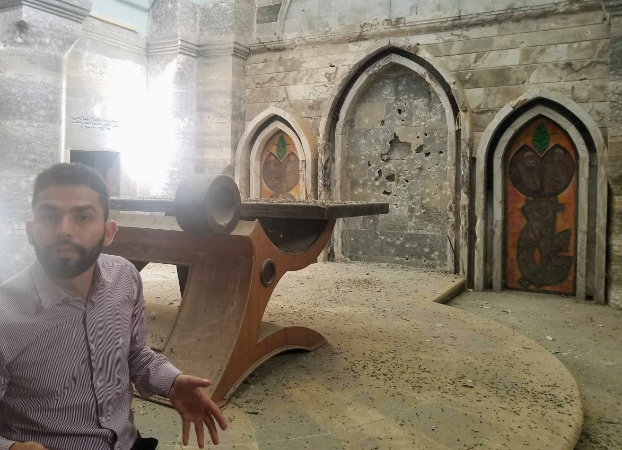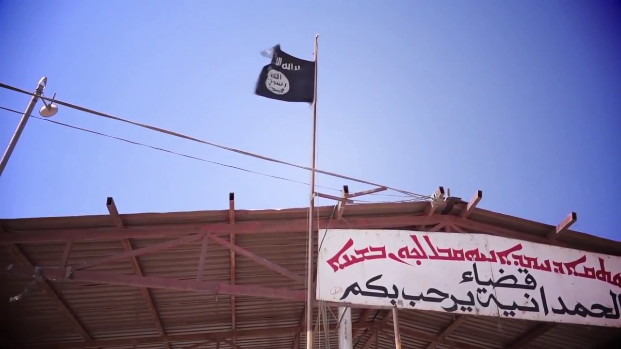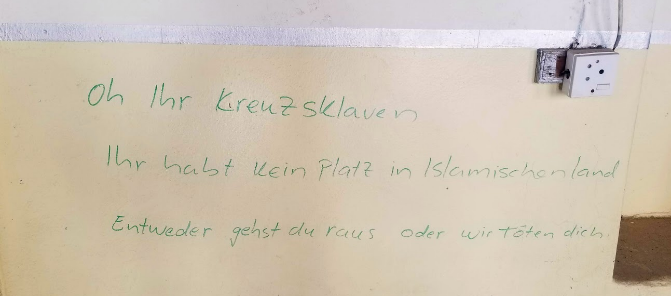Death by Emigration: Two Years After ISIS, Catholics Are Still Fleeing Iraq
COMMENTARY: PART I — Iraq’s mostly Catholic Christian population declined from 5% to 0.2% between 2003 and 2019. Today, after 17 years of church bombings, targeted assassinations, kidnapping and displacement, the Christian population in Iraq likely stands at 120,000.

WASHINGTON — Iraq’s native Catholics used to be a thriving minority: The deputy prime minister was a Chaldean Catholic and universities were filled with Christian faculty. Iraq was a dictatorship, but it enforced a basic social contract between Iraq’s religious sects that provided, if not an ideal situation for Christians, an opportunity for relatively peaceful coexistence between Christians and Muslims.
Everything changed in 2003, as U.S. tanks rolled into Baghdad.
“It felt like salvation, after 40 years of Saddam’s regime,” said Joseph Hanna Joshua, 43. “At that time, we thought the Americans would turn Iraq into an industrial country.”
But he remembers how Iraqis trying to greet soldiers or give them flowers would be told, sometimes profanely, to “back off.”
“Until this day,” he said, “we still wonder: Were the Americans liberators or occupiers?”
Sunni Arab groups such as al-Qaida, which grated against both the U.S. occupation and the rise of Iraq’s Shiite majority, began an insurgency against both, empowering Islamist groups that targeted Christians.

A deacon in Tel Keppe, the town where Iraq’s deputy prime minister in Saddam Hussein’s regime, the late Tariq Aziz, would have attended church as a child.
The building was used as a prison by ISIS, and the altar was used for target practice. Today, only 130 of the original 4,000 Catholics in the town have returned.
Christianity Targeted
A Human Rights Watch director once claimed that Iraqi Christians “had suffered no more than others.” If this were true, it certainly wasn’t the intention of extremists, who, between 2003 and 2013, delivered intimidating letters to Catholics, hijacked mosque loudspeakers to broadcast anti-Christian messages and kidnapped priests, with the same message: Convert to Islam, die, or leave Iraq. If that weren’t clear, they executed industrial-scale murder, bombing 74 churches before ISIS even took Mosul. Since 2003, at least 1,357 Christians have been killed in recorded incidents; countless more have been kidnapped and threatened.
ISIS’s occupation of 12 Christian-inhabited towns between 2014 and 2017 was the peak of this insurgency. In 2019, I spent three months in the largest of these, Qaraqosh, an almost exclusively Syriac Catholic town near Mosul. ISIS wasn’t the first Islamist group to persecute minorities — but it was the first to build a modern state in the region — and it was this statecraft that incited the mass displacement of Christians. Most of its slick propaganda videos are actually about regulations and policy, rather than its creative ways of liquidating Christians and other perceived enemies of the state. ISIS’ pitch wasn’t just a religious one: It was a promise to keep the lights on, to restore public order, and to prosecute petty crimes without taking bribes.

The Islamic State flag raised above the main checkpoint to QaraqoshQaraqosh, Iraq’s largest Catholic city.
But regulatory reforms aside, the outcome of this propaganda campaign was clear soon after ISIS established its state: On June 15, 2014, for the first time in 1,600 years, no Mass was celebrated in Mosul, formerly the center of Iraqi Christianity. A month later, almost all remaining Christians fled to the autonomous Kurdish region in the north. Some of the 7% who were unable to escape were forced to convert on pain of death, while others, including around 250 Catholic women from Qaraqosh, were kept as captives and sometimes used as sex slaves. ISIS issued a price list for Christian and Yazidi slaves that valued, for example, an 8-year-old girl at $170.
That same year, 2014, legal and illegal emigration by Christians, which had been occurring for years, accelerated to an all-time high — and it’s not decreasing. Last year, 14,480 Iraqi Christians made a humanitarian application to Australia, one of the most common destinations — almost exactly the same as the figure for the previous year. Out of 102,000 displaced Christians in the Nineveh Plains, only 35% have returned. In 2019, more Christians in the region chose to leave Iraq altogether rather than return to their hometown. In Qaraqosh alone, 3,000 Syriac Catholics left over the course of just three months, a drop of 12% in the Christian population of that city.
In Qaraqosh, the most common question to visitors is: “Where are you from, and how can I get there?” Some offer to pay cash for a visa.
Heroic Return
A small number return, such as Joseph Hanna Joshua, an author, teacher and journalist, who was displaced twice in Iraq before seeking asylum in France in 2016.
“My wife and I had two choices: spending our lives in France, passing years learning the language and hunting for work, or returning to Qaraqosh, where I could not only resume my work but raise my children there.”
Joshua chose the latter, returning in 2018; he now teaches and helps organize concerts. “The conditions are not ideal at all, but when were the conditions of Christians in the Middle East ever ideal? I pray every day that circumstances will not force us to leave Qaraqosh again,” he said.
Most never come back, though, and emigration of this scale poses an existential concern. It means safety, but also the eventual dissolution of a distinct cultural and religious identity. In Qaraqosh, 92% of Christians speak Aramaic. Young people almost all attend Mass, and their smartphones are often set to images of the Virgin Mary. This culture does exist in parts of the diaspora outside Iraq, but it fades quickly as children adapt to the West.
Archbishop Petros Mouche of Mosul, who leads Iraq’s largest diocese and is the only bishop to live permanently in former ISIS territory, lives in Qaraqosh, intending it as a “sign of encouragement to the faithful, so they might return quickly.”
“For those who want to leave the country, I tell them that it’s their business to decide,” Archbishop Mouche told the Register. “For my part, I prefer to stay here, and I would like the faithful to stay, too, to witness to Christianity and be faithful to our ancestors’ legacy.”
The archbishop’s diocese includes the only one of 45 destroyed churches in Mosul to have been restored to use. It serves the city’s remaining 30 or 40 Christians, as well as those who commute to Mosul for work or study.
“Christians still hesitate to return to Mosul, as the situation isn’t stable and the future of Iraq is still unclear, but, perhaps, once a priest lives in Mosul and begins to celebrate the liturgy, our people will have more courage to return to the city,” Archbishop Mouche said.
But not everyone in Iraq sees things as Archbishop Mouche does. Andrew Yako, 22, a resident of Qaraqosh, plans to join family in Detroit: “The government can’t provide safety for people living in its cities. We follow Jesus, our Savior, and because of that, we can’t go to war [against ISIS], which makes us an easy target.”
Under ISIS Duress
Although the Iraqi Army is better organized than it was in 2014, Qaraqosh’s small Christian militia would be no match for ISIS, which remains active, occasionally bombing checkpoints, assassinating tribal leaders, and burning the crops of uncooperative farmers. In October 2019 alone, 26 civilians were either murdered by gunmen or found in shallow graves. With the recent fraying of U.S.-Iraq relations, some anti-ISIS operations have been delayed, giving the group a comeback opportunity. Geography is critical. Qaraqosh might be a Catholic fortress, but it’s only a 20-minute drive from Mosul, where Abu Bakr Al-Baghdadi declared the caliphate in 2014 and where ISIS’ new leader, Abu Ibrahim Al-Hashimi, studied sharia law at the University of Mosul.
Although Qaraqosh hasn’t had any major security incidents since 2017, this has come at a cost. Outsiders can’t purchase property and need a reason to enter. (My taxi driver, a practicing Sunni Arab from Mosul, used to visit Qaraqosh to drink alcohol with his friends. Today, he has to state his reason for visiting and surrender his ID.) Both measures harm the economy, which worsens unemployment and increases the impetus for emigration. “There are no jobs here, and there is no money,” said Yako.
Security and jobs are easier to solve, though, than the trust issue. For all the money poured into peace-building conferences, Iraqi Christians don’t mince their words about Muslims, out of earshot of journalists and aid workers. The assistant of a cleric routinely calls Muslims “dirty.” A friend tells me “the only good Muslim is a bad one — one who doesn’t care about his religion.” Another claims that “Muslims will accept an invitation to lunch, but they won’t hesitate to kill us if ISIS comes back.” Many warned me against letting Muslim immigrants into my country. Their words are harsh and they’re wrong, but it’s difficult to explain this to someone whose home was burned by men who recite the Quran five times a day.

German graffiti at a church in Batnaya, a Chaldean Catholic town, reads:
“Oh slaves of the cross, you have no place in this Islamic land. Either you leave, or we will kill you.”
The town was occupied by foreign ISIS fighters, reflected in German and English graffiti still visible today.
Grim Alternatives
Qaraqosh used to have 55,000 residents in 2014, down to 21,000 today; Yako estimates that in 20 years, there will be 3,000 left. “I am lonely, uncomfortable and worried — the only thing that keeps me alive is Jesus. We are waiting for him to come.”
Others are less hopeful. One Catholic, at a wedding party, described his despair.
“If you stay in Iraq, you can live with your people, but you have nothing. If you leave, you have everything, but you’re alone.”
This article is the first of two on Catholics in Iraq. The next will focus on the impact of Iran on Iraqi Christians.
Xavier Bisits is a management consultant based in Washington, D.C., who previously worked in Iraq.
In no way is this article related to, informed by or endorsed by his employer. Some names in this article are pseudonyms.















